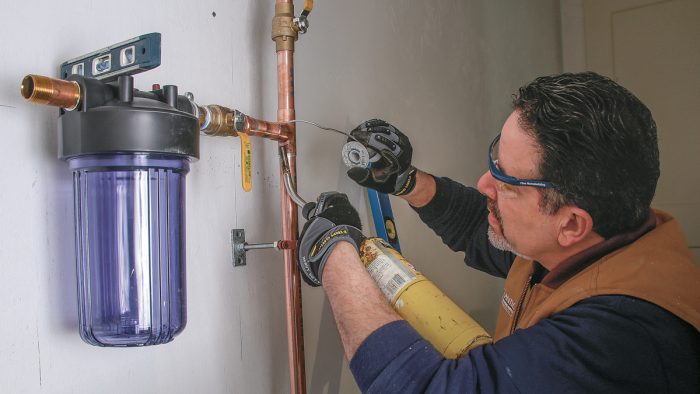The decision whether to install a whole house water filter or a point-of-use system can depend on many factors. There’s the advantage of lower costs with a point-of-use filtration system to treat the water for drinking and cooking. However, many people prefer the more expensive option of installing the best whole house filter that matches their flow rate, water pressure, and other system factors.
The tremendous benefits of a whole house water filtration system includes savings on appliance repairs, clothes and other items that can be affected by hard water and other contaminants as shown in this guide. Treating drinking and cooking water only is an option some must choose, but whole house water treatment offers these health and lifestyle benefits:
• Properly treated water for better health
• Removal of odorous water used for cleaning clothes
• Reduction of lime scale and rust stains
• Sifting through high levels of chlorine, magnesium and calcium
• Reduction of chlorine from water and air to reduce side effects such as drying out skin
• Reduced cases of allergies and skin and hair problems
• Drinkable water
• No spots on dishes
• Increase in your home’s value
Dealing with Private Wells and City Water
Whether you have a private well or use city water, there are risks to your water supply that can justify installing a water filtration system. Private wells generate many concerns, such as the E.coli and coliform bacteria found in about 40% of private wells. Runoff and other contaminants can easily get into well water, and even relatively safe water can be hard with mineral content that damages taste and smell while generating damages with rust and scale.
Public water is generally safe, but there are hundreds of potential contaminants that aren’t regulated in any meaningful way. An average of 658 notices to “boil water” are issued by cited and water districts each day as water supplies become contaminated by ruptured pipes and pollutants.
Taking Note of the Number of Bathrooms in Your Home
It’s important to note the number of bathrooms to choose the best water filtration system. Multiple bathrooms mean that you might have a shower running, a toilet flushing, water running from multiple sinks and a dishwasher and washing machine drawing water simultaneously. It’s important to calculate how much water can flow through your system during peak usage.
Knowing the number of bathrooms is the easiest way to estimate water flow so that you can choose a filtration system that meets your household needs. Flow rate, water pressure level and water chemistry impact your choice of the ideal treatment system.
Number of People in Your Household
People use an average of 80 gallons of water per person per day. If you have teenagers, that rate could easily skew higher. It’s important to estimate your water usage to choose the best system possible.
The number, sex and age of each family member provide clues to water usage to help you make an accurate estimate of water usage within a 24-hour period. Some might take multiple showers or baths while common processes such as running the dishwasher and washing machine can be prorated or added to the estimated maximum water usage total.
What’s in Your Water Besides Hydrogen and Oxygen?
Knowing what’s in the chemical makeup of your water is critical for determining the best option for water treatment and filtration. You might have excessive mineral content, fertilizer and pesticide runoff of even traces of lead. If you do have lead in your water, it’s necessary to hire an ESP water specialist to remediate the problem.
The Environmental Protection Agency plays a major role in your water’s quality and treatment. The EPA requires all water systems to issue an annual report on the quality of your water. If you use a private well, testing your water is a critical first step. The analysis can reveal any special problems that need to be addressed when designing your pump and filtration system.
Choosing the Best Whole House Water Filter
Using your annual Consumer Confidence Report and information about your flow rate, pressure level and local contaminants, you can make a wiser choice of a water-filtering system. The top types of whole house water treatments include:

• Carbon Adsorption: Activated carbon files out small particulates, large organic molecules and microscopic particles, and the filter ranks among the most popular, both commercially and residentially.
• Sediment Filtration: This system can remove suspended contaminants including dirt,sand, scale, silt and organic material.
• Ion Exchange: This process purifies water by exchanging unwanted ions with safer ones, and the process can purify, separate and decontaminate ions in water.
• Catalytic Conversion: This recent advancement in filtration technology is used to remove magnesium and calcium from hard water without salt.
• Oxidation Reduction: This method purifies water to remove contaminants using electrochemical oxidate, reduction and adsorption.
• Ultraviolet Sterilization: This method disinfects water by attacking and destroying bacteria, viruses and other pathogens.
Choosing the best whole house water filter involves some research and testing, but once you get your system in place, it typically works for years to purify your water.








